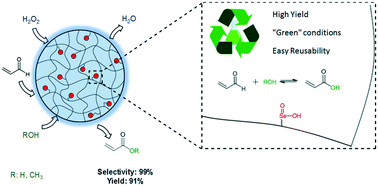Synthesis of acrylic acid and acrylic esters via oxidation and oxidative alkoxylation of acrolein under mild conditions with selenium-modified microgel catalysts†
Abstract
Systematic studies of acrolein oxidation and oxidative alkoxylation catalyzed by Se-modified microgel catalysts under mild reaction conditions were conducted. Se-modified microgels proved to be highly active colloidal catalysts and exhibited high performance for the oxidation of acrolein to acrylic acid and oxidative alkoxylation to the corresponding methyl/ethyl/butyl acrylates using hydrogen peroxide as a green oxidant. Methyl acrylate or acrylic acid can be synthesized in high yield (89–91%) and with high selectivity (97–99%) simply by regulating the solvent type and the concentration of selenium moieties in the microgel structure. Se-microgels exhibit exceptional catalytic activity compared with other Se-containing molecules of organic and inorganic nature. Due to the unique properties of the microgels that combine advantages from homogeneous and heterogeneous catalytic systems in terms of activity and selectivity as well as re-use possibilities, Se-microgel catalysts can be easily separated and reused in several catalytic cycles and remain highly active.



 Please wait while we load your content...
Please wait while we load your content...